The easy guide to explaining truly scary geopolitical events to your kids without freaking them out
We have two firm rules at home: 1) Have fun; and 2) Don’t get killed while doing so. They’ve worked well enough: Our two girls have had their share of chosen amusements, and survived with only the odd broken bone.
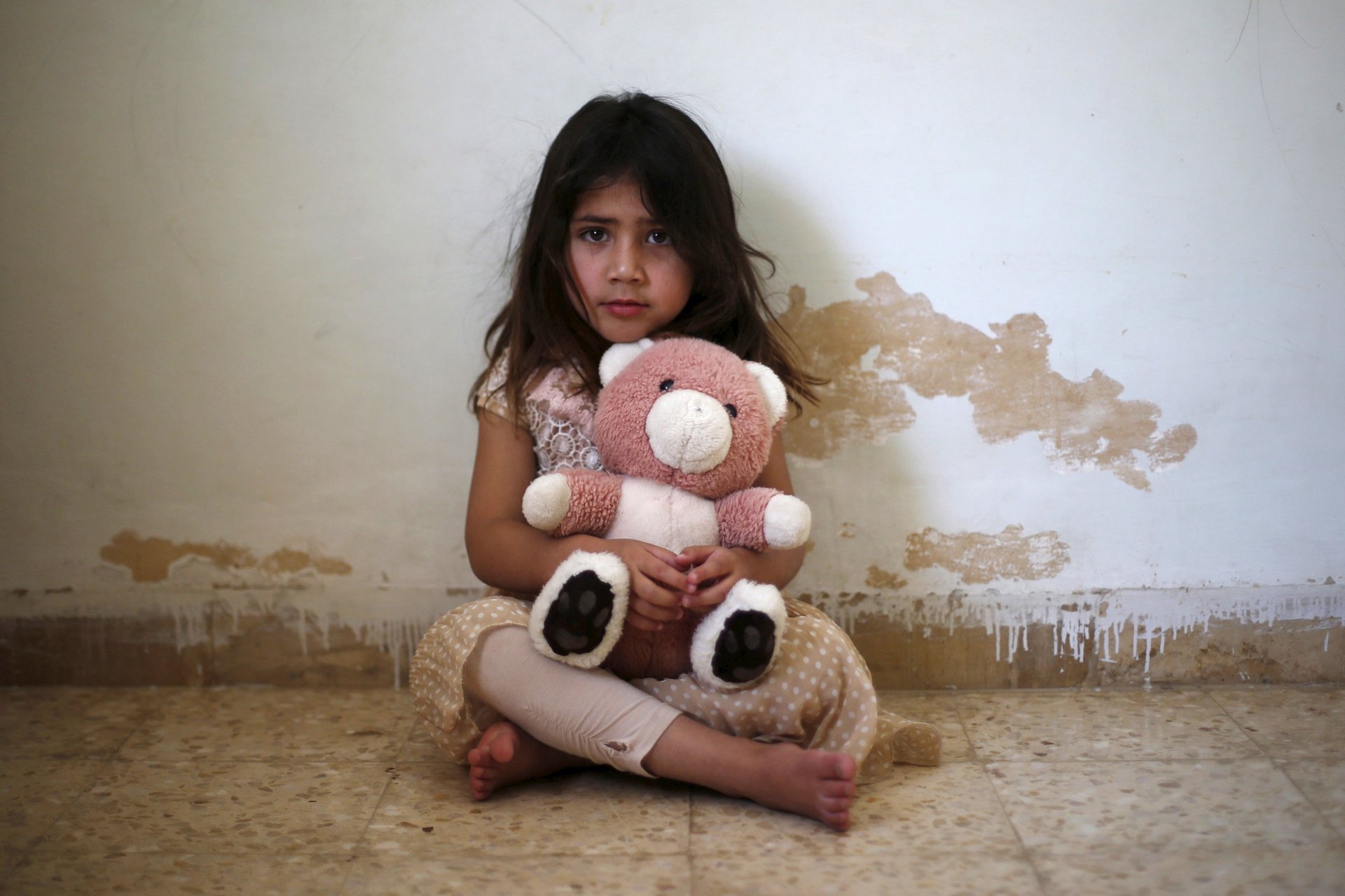

We have two firm rules at home: 1) Have fun; and 2) Don’t get killed while doing so. They’ve worked well enough: Our two girls have had their share of chosen amusements, and survived with only the odd broken bone.
This isn’t whimsy. Lots of scary things are going on out there. But we choose not to cower—there are necessary knocks, as long as they go only so far.
Only now, the rules seem inadequate. Our oldest daughter just turned 13, and the youngest is going on 11. We have long debated how much our children should actually know about the world around them, including the unpleasant stuff—Islamic State, Charleston, and so on. It seems time for a broader set of sensible guidelines—a way to look at the world not only in terms of basic personal security and aspiration, but with insight into how things work in the big picture. Oh yes, and while not frightening them.
Especially if you were alive during the Cold War, you know that geopolitics is the stuff of which end-of-world nightmares are made. Then there are the moments of common sense triumphs–like right now, when a historic deal between the world and Iran seems possible. But how to explain all this?
I queried the youngest. “What’s geopolitics?” she said, clipping the words. Yet her and her sister’s interest arose when I went on to ask how to make sense of the world for them and other children. They gave me two new rules for how to talk about this stuff. Rule 1: “Explain all the concepts, even if you think we know them already,” the youngest said. Her sister added rule 2: “And don’t use big words.”
It’s possible, it turns out, to keep up with the geopolitics, er, the big news out there, with your kids. Here are some suggestions for where to start.
In Russia, the important thing is Putin
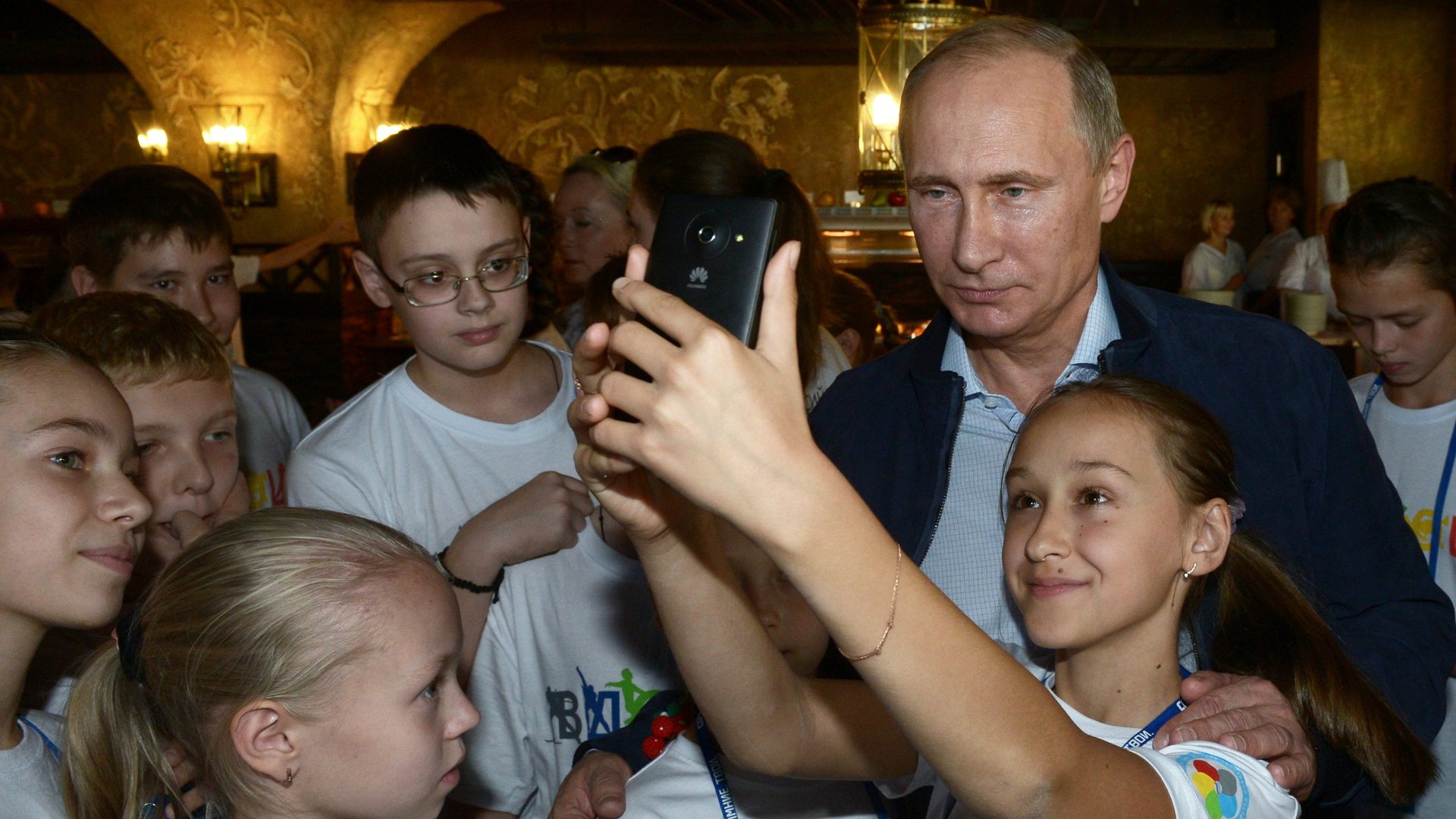
Why not begin with Vladimir Putin’s own kids? Russia’s president has two daughters—Maria and Katerina. They are grown up. Until recently at least, Maria, a trained biologist, lived in the Netherlands, and Katerina, an accomplished ballroom dancer, in Moscow.
Both daughters have always stayed out of the spotlight; almost no one in Russia has any idea what they even look like. You might call that a telling detail, because Putin himself is surrounded by an air of mystery. That goes back to his original career–for 16 years, he was a spy–followed by his surprising appointment just nine years later to run the biggest country on Earth by land mass.
In fact, no one could have predicted Putin’s rise to the peak of Russian politics, a position he has held under a couple of titles for the last 15 years. But his people like him–89% of Russians approve of how he’s doing his job, according to a new poll. That’s a remarkably high rating. Germany’s leader, Angela Merkel, for instance, is regarded as terrifically popular with ”only” a 64% rating as of a June 23 poll. US president Barack Obama’s is at 50%, which is his highest in months.
Here’s where things can become tricky. To explain why Putin attracts so much attention at the moment, we need to talk about Ukraine, and to a child, that can possibly be disturbing.
For our own kids, we think it’s not an insurmountable problem–we merely skip the worst blood and guts, including the downing of MH17 last year; there’s no upside in them becoming fearful of flying. As a framework, in fact, it’s rather been useful for them to explore Putin’s winning formula, which has been his decision last year to invade Ukraine and take over a southern peninsula called Crimea.
Putin says that this conquest–which is formally called annexation–is a normal and acceptable thing. Crimea, he says, is rightfully his country’s, first and foremost because a Russian empress called Catherine the Great conquered it more than two centuries ago. He also says that Americans and many Europeans don’t respect Russia, and want it to be weak and poor; the annexation, he suggests, lets the West know that Russia can’t be pushed around.
All in all, the invasion and this sort of language makes Russians feel that Putin is a patriot, and is defending them. In fact, they don’t believe that Russia has invaded Ukraine at all–they think that Americans have caused all the trouble, and are behind the fighting.
Here’s how the invasion looked in real time.
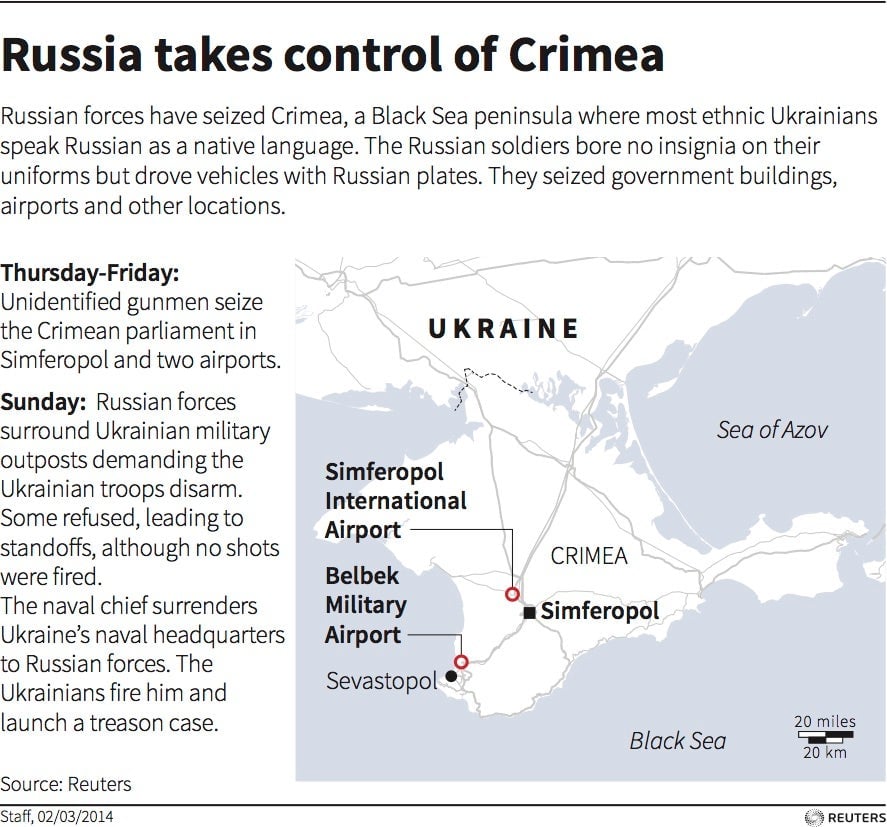
For their part, Americans and Europeans are extraordinarily upset. They say Putin is responsible for the deaths of more than 6,000 people, people who died simply so that Russia can keep control of Ukraine. And they worry that he may invade other countries in the name of Russian patriotism. Putin himself says such thoughts are “insane,” but after the Ukraine invasion, the US and Europe think they need to be prepared to defend themselves just in case.
As a result, the United States and Europe have punished a number of Russians whom they say are the most responsible for allowing the Ukraine invasion to happen. The punishments are called “sanctions,” and make it illegal for Americans and Europeans to do business with these Russians. The sanctions will stop when Russian soldiers stop fighting in Ukraine, the US and Europe say.
Who is right? Memories of the past are somewhat at fault. These include bad European memories of the Soviet Union, the country that Russia dominated but that fell apart in 1991. Soviet armies occupied their streets for a long time. Putin’s nightmares include a recollection that NATO, the US-European military alliance, was established to fight the Soviet Union. He says NATO is moving too close to Russia’s borders.
But it seems wrong to absorb the territory of another country–to kill Ukrainians and destroy their cities. NATO is not threatening Russia, and there is zero chance of any US or European military strike on any Russian target. The US did not invade Ukraine, nor is it Russia’s enemy. Putin has invented the frightening picture that he paints of Ukraine and western nations, and gained his people’s support by appealing to their natural fears and patriotism.
No one should take comfort in their children being only, well, children. For those whose kids will be in their twenties in the 2020s, they may be dealing with this same situation, because Putin is likely to still be Russia’s president through at least 2024.
China has a long memory
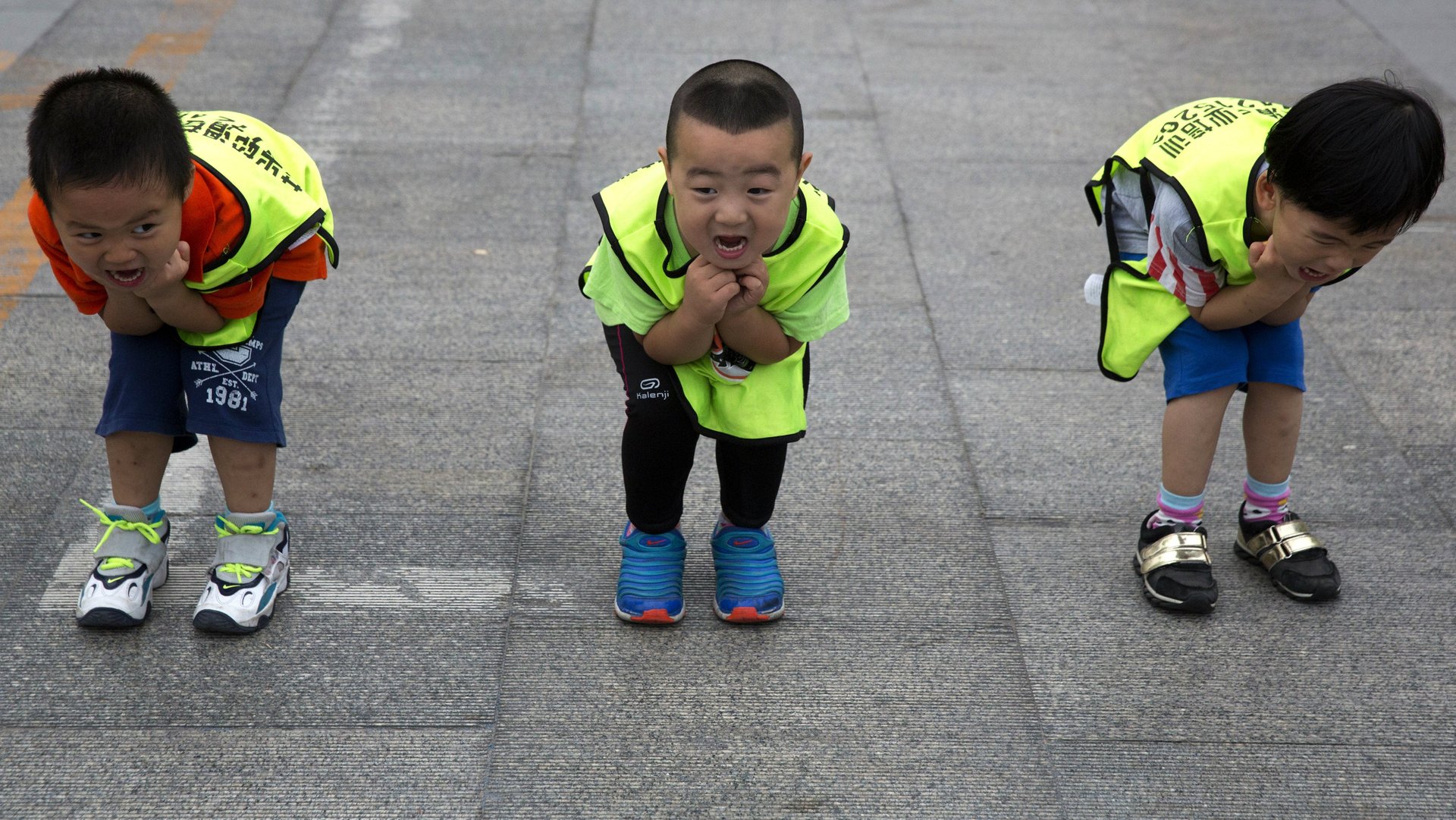
The main things to say about China is that it keeps becoming stronger and richer, and that makes other countries nervous.
By a number of measures, China is the most important country in the world—it has the biggest population, seems to have the largest economy, and has the most cash in the bank ($3.7 trillion).
The reason we say that China only seems to have the largest economy is that there are quibbles (including by Quartz’s main China economy watcher, reporter Gwynn Guilford) over how Chinese business is counted.
But however you sum up China’s accomplishments, there are no doubts that it has become one of the two most powerful countries on the planet.
Like most kids, ours like simple black-and-white stories—good guys versus bad. But as long as I don’t go on too long, they don’t mind if the stories are a little more nuanced. So in this case, we explain that when we say that China’s growing power worries almost everyone who isn’t Chinese, we don’t mean the way that Vladimir Putin makes them jumpy. The US and Europe, for instance, are nervous largely because for the better part of the last five centuries, they have been the world’s most powerful peoples. And they would like to keep being the most powerful and influential countries in the world.
But Americans and Europeans know that, at a minimum, they’re going to have to start sharing power with China. They just hope that they don’t have to wholly give it up.
The question on everyone’s mind is how will China behave as a dominant world power. Among the people most worried about this question are China’s neighbors, such as the Philippines and Vietnam, who fear being pushed around.
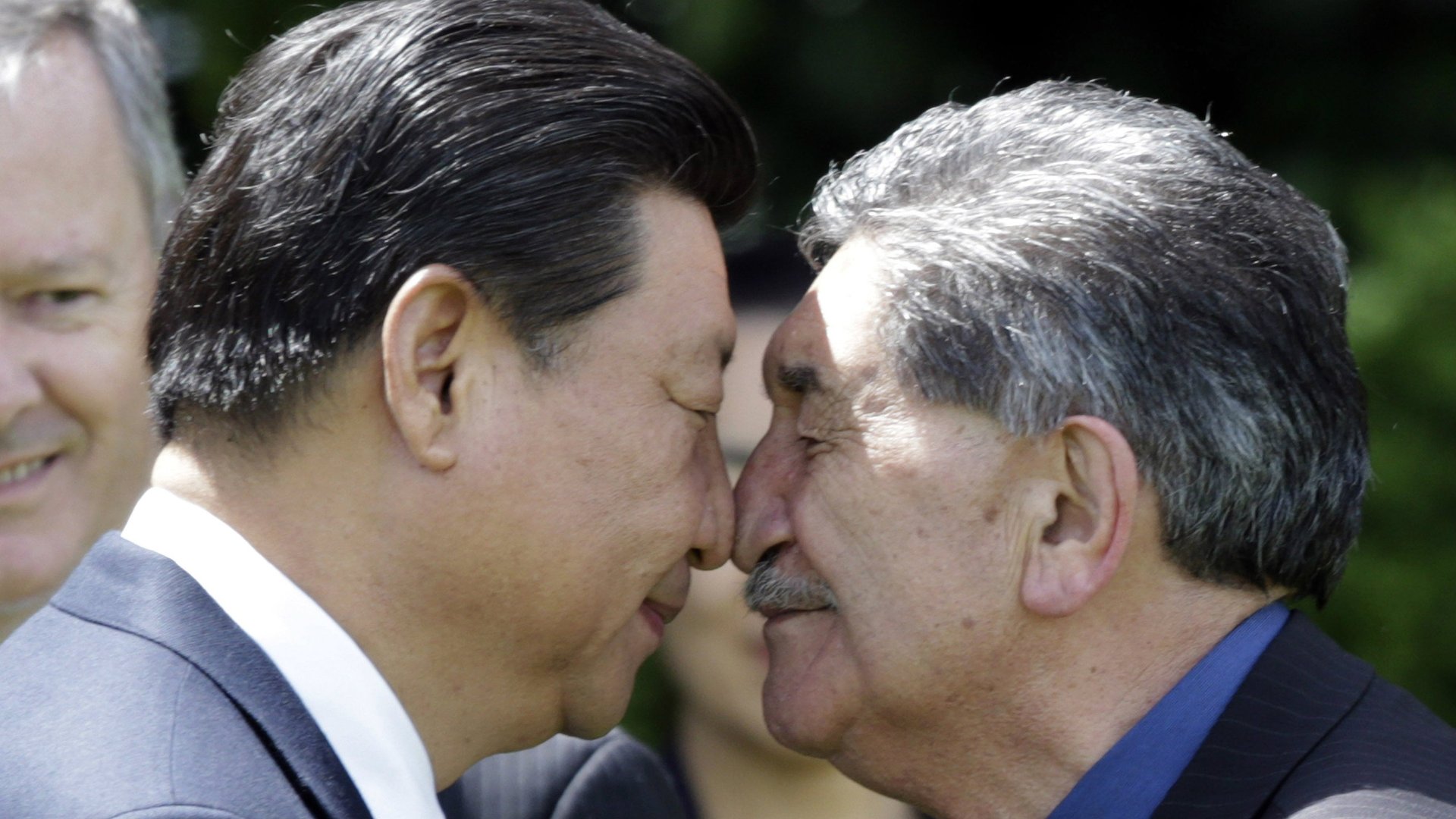
For his part, China’s leader, a man named Xi Jinping (pictured right), says that no one should worry. China is peacefully working to improve the lives of its people so they can do normal things like own cars, have nice homes, and eat decently.
But China’s motivations are not as simple as Xi explains. Like Russia, China is unhappy at how outsiders have treated it through history, including the so-called “Opium Wars,” in which Britain attacked and forced China to pay huge sums of money and give up some of its land, such as Hong Kong. That was in the 1800s. Then in the first half of last century, Japan invaded China and committed horrendous crimes.
These incidents aren’t history to China, but fresh wounds. When China is building up its economy and its military, such memories are part of its driving motivation–it intends to keep anything like them from happening again by building a very strong economy and a very strong military.
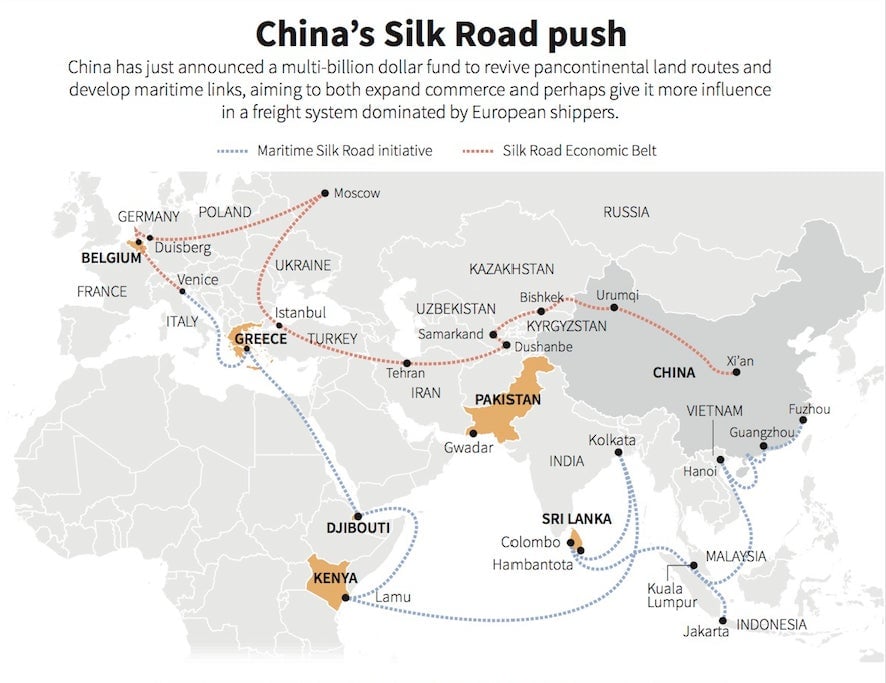
One of the things you may not have noticed–but that you definitely will in a few years–is an enormous web of new Chinese construction projects. These roads, ports, railroads and other stuff on almost every continent are meant to make the rest of the world work better with China’s economy. China calls it a new Silk Road (see above).
The Silk Road refers to a long, famous route along which ancient merchants used to travel to and from China. They did that for about six centuries, until the 1400s, when China closed up and the route shriveled. Now that China is rebuilding it bigger than ever, some of the rest of the world wonders whether they will lose something.
Something you almost certainly have heard about is that China is building a few new islands in a place called the South China Sea, which is just to the east and south of China. This work makes China’s neighbors and some other countries nervous because, they say, the islands are being built on their parts of the sea, and China is adding runways that can be used by its military.
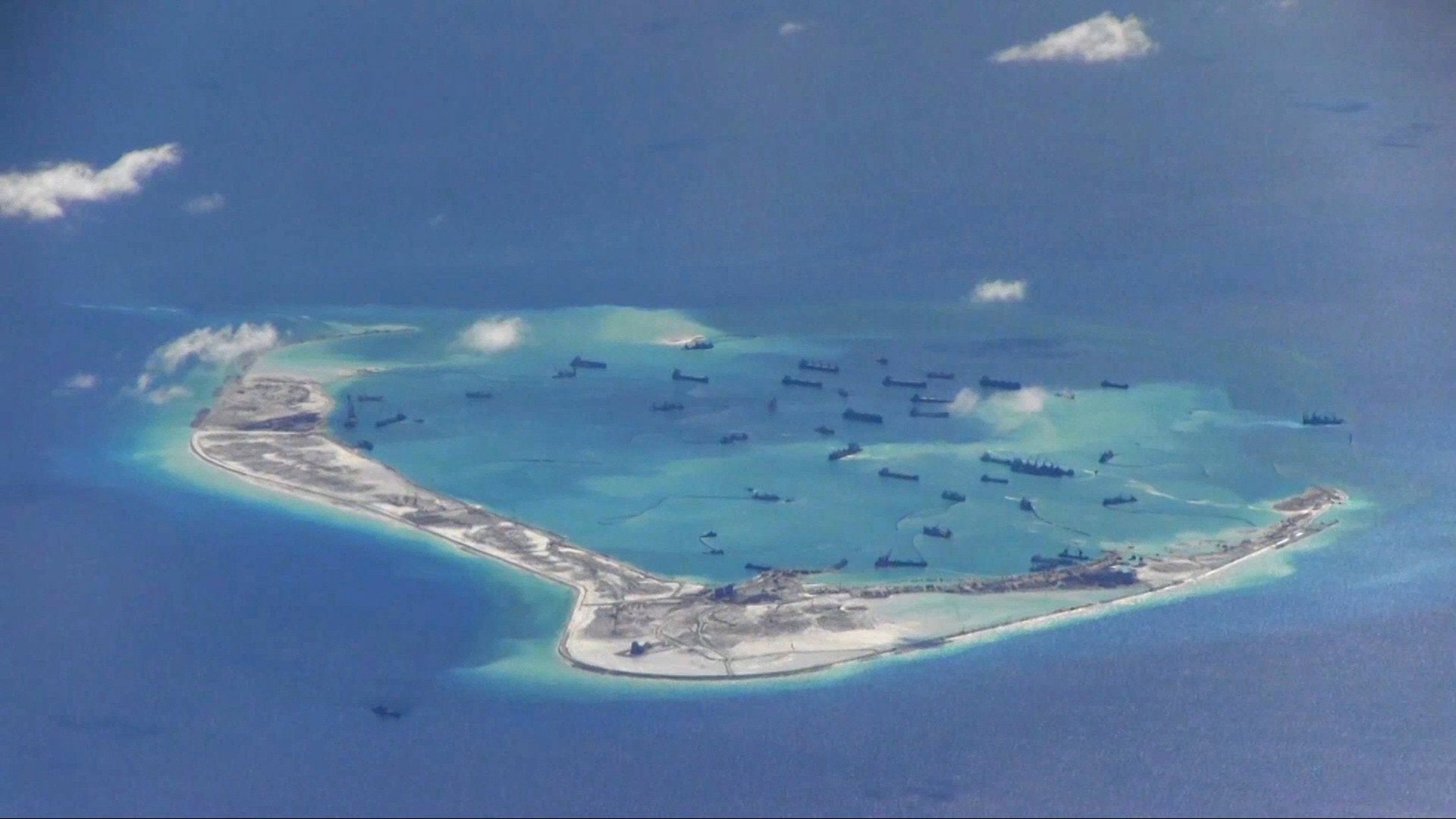
Here are Chinese dredging ships working to enlarge an island called Mischief Reef. The photo was taken by a US military plane.
It seems pointless to try to figure out China’s motivations. It also seems pointless to become hysterical about its rise. The fact is, China is very rich and large, and becoming only more so. The United States and Europe are also rich and large, and are likely to remain so. They will figure out how to thrive together.
Almost no one, adults included, gets the Middle East
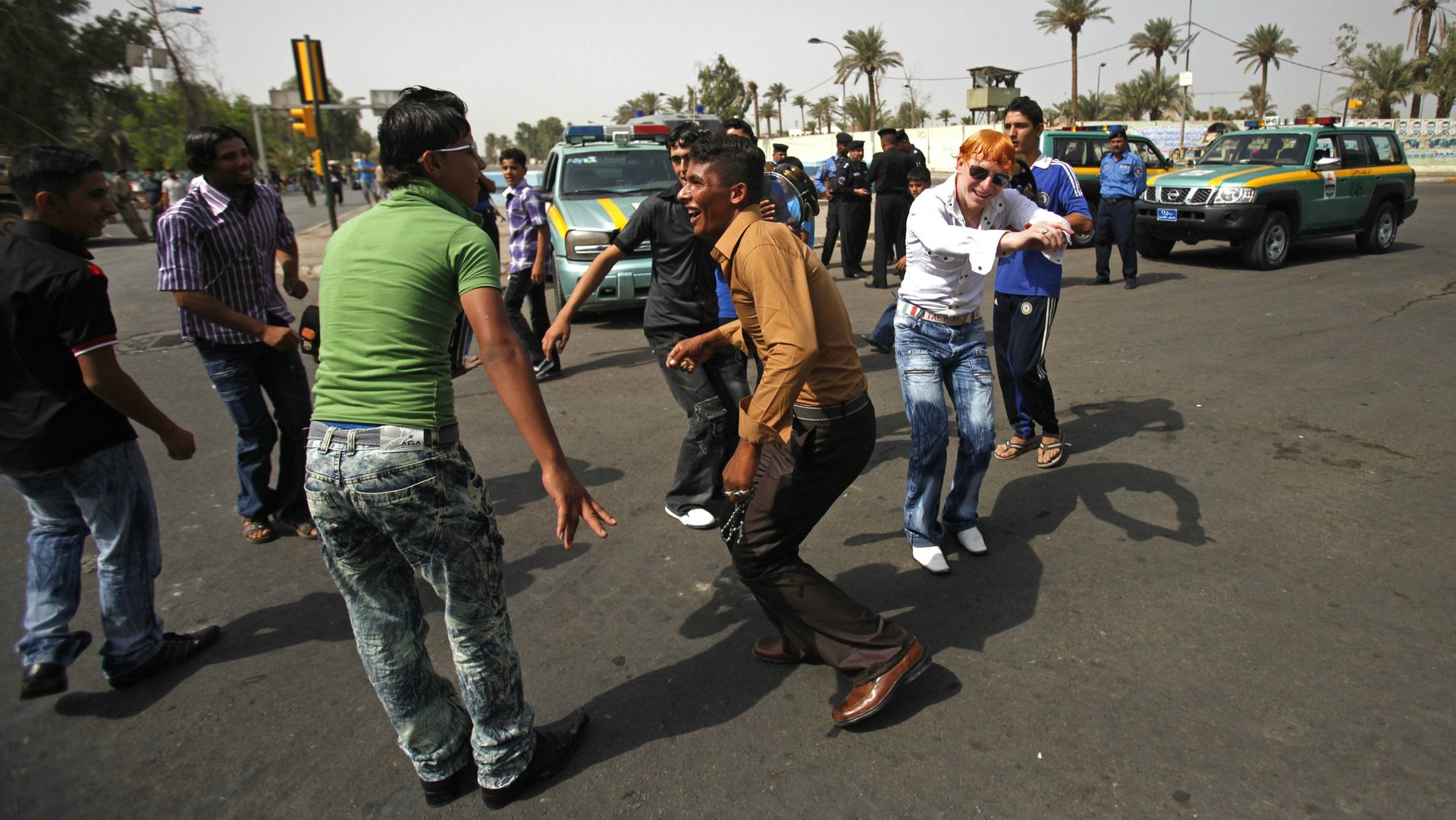
It’s tempting just to skip the Middle East, right? How can you possibly guide a kid unbruised through this hurricane? The answer, for us at least, is that we have to—that what’s happening there is frightening, but it’s also going to persist for decades, and probably longer. So it would be irresponsible in the extreme to give it a pass.
Starting out slowly, how about posing the simple question, why is so much horrifying news concentrated in the Middle East–people we don’t know bombing and shooting people they don’t know in Iraq, Syria, and Yemen; Israelis and Palestinians in relentless conflict; and one-off slaughters in Algeria, Kuwait, Tunisia, and elsewhere?
These are people with serious complaints, sometimes going back to their descendants centuries ago. Their sects, religions, and clans reject one another.
But on top of that, almost every Middle East country is ruled by an unelected dictator or king who cares only about a couple of things: earning a lot of money, and staying in power. This makes parents in those countries angry because they can’t improve their children’s lives; it makes their children angry because it’s hard to find a job, regardless of how hard they study.
But there are a couple of ultra-important events that make the place much easier to understand:
1) A decision in 2003 by the United States to invade Iraq. The U.S. president at the time was George W. Bush, and he said that the invasion was necessary to stop Iraq from using dangerous chemical or nuclear weapons. But after American troops overran Iraq, they found no such weapons. Then Bush said that he wanted to seed democracy in Iraq, but that didn’t work. Instead, there have been 12 years of war. Bush and his closest advisers still defend the war, but many others—with very good reason—think that the decision to invade was foolish.
2) The “Arab Spring.” In December 2010, a Tunisian fruit-seller became really angry when a policewoman stole some of his fruit and slapped him. Injustice like that had been going on for a long time. But Mohamed Bouazizi had reached the end of his patience. He decided to do something about it.
[Note to parents: the next sentence is graphic and, for younger kids, you might want to substitute this phrase: He injured himself in a very harmful way.] And in a tragic act, he poured fuel over himself and lit it on fire. [All kids can read from here on.] A week later, he died in the hospital.
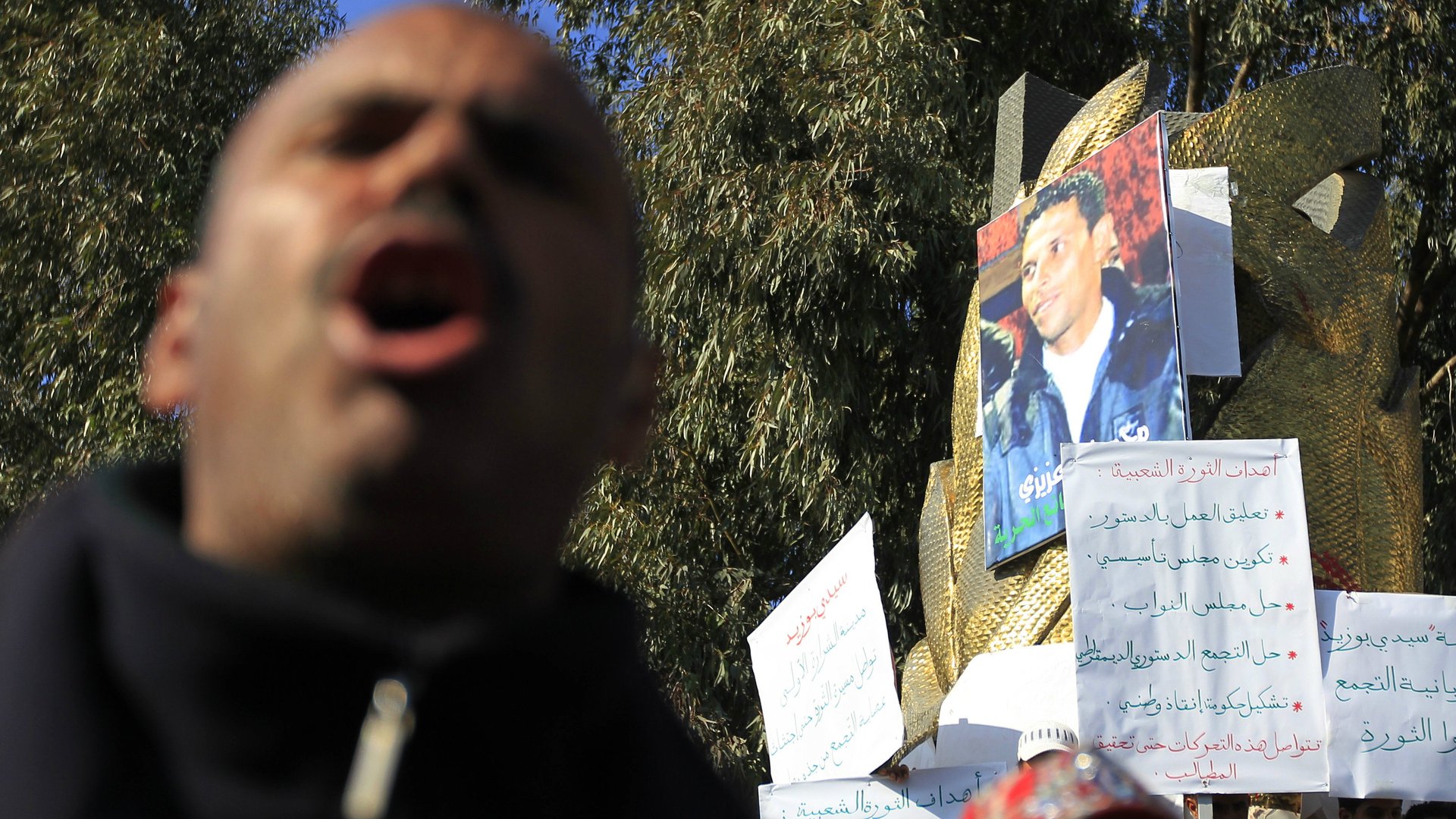
Someone posted a video about Mohamed on Facebook, which made a lot more people angry–not only in his own village, but across Tunisia and then beyond its borders. They held protests, like the one in this picture.
Tunisia’s dictator had to flee the country; Egypt’s leader was forced to resign. Libya’s fled, and was killed. Syrians went into the streets to protest against their dictator. To keep his people from rising up against him, Saudi Arabia’s king suddenly announced that he was giving everyone a lot of money.
People who saw all this happening, all of it resulting from Mohamed’s act of desperation, named it “the Arab Spring,” which suggested a blooming of something young and beautiful.
These two events—the invasion of Iraq and the Arab Spring—have now intersected and become one of the main causes of the violence you see every day in the Middle East. Iraq is a source of chaos, and the Arab Spring has brought out the anger of ordinary people across the region.
Iran may be the good news story of the year
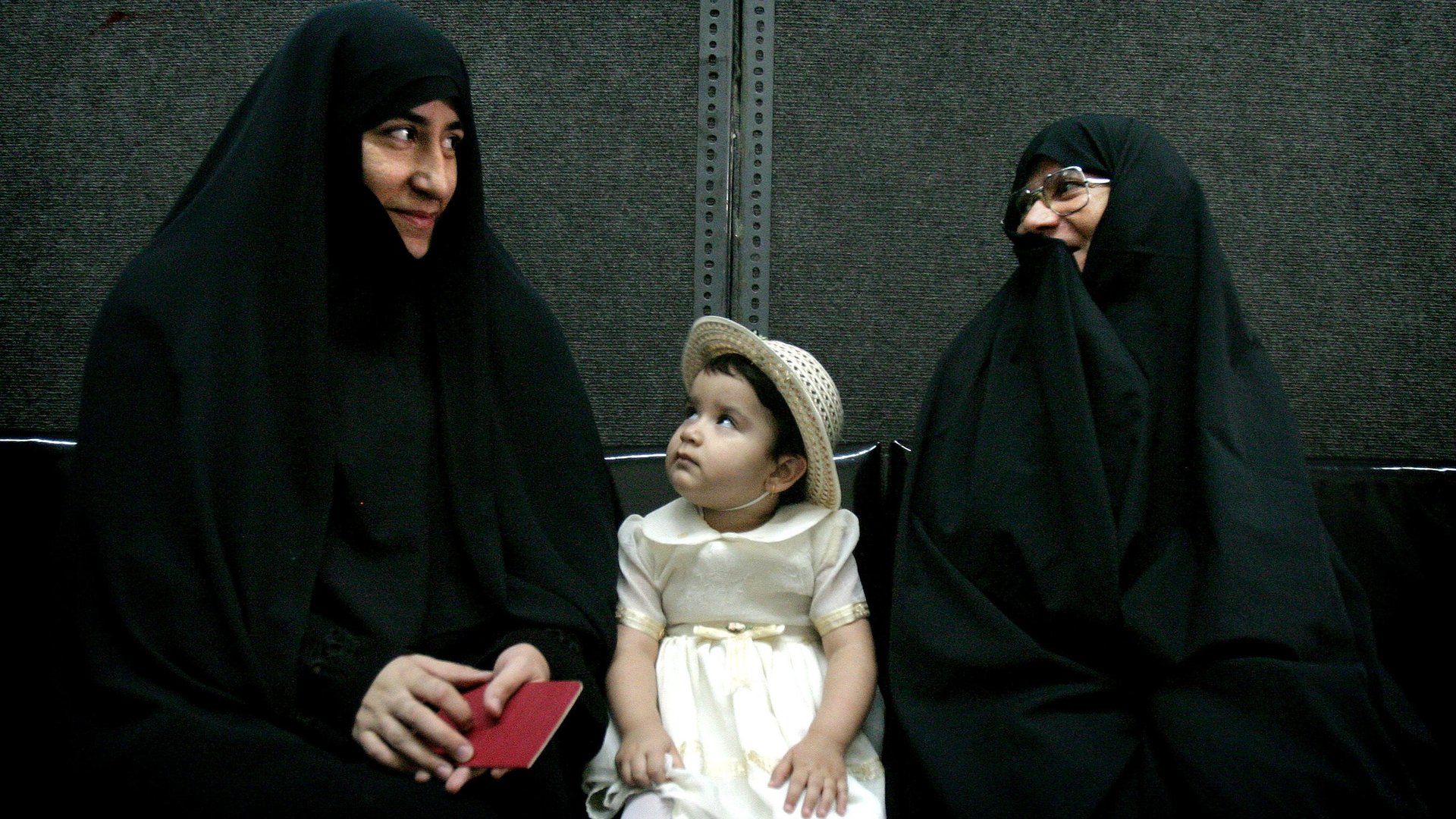
It’s important for our kids to know that not everything going on is bad news. For three and a half decades, Iran and the United States have been enemies. But a deal between them, reportedly with just a couple of issues remaining to conclude, would mean a good chance that that state of tension will relax: Leaders of the two countries would still be very suspicious of each other; but they may be on the way to talking through their differences, rather than only threatening each other.
At our house, we’ve been talking about this story since the “Green Movement” in 2009. That’s when Iranians went into the streets to protest when they suspected that the country’s leaders had changed the results of presidential elections to keep power.
For our kids, this was one of these easy-to-understand white hat/black hat events. And because we had introduced the characters so far back, they have been all the more interested now in the more complicated nuclear discussions.
The complaints between the US and Iran go back six decades, thanks to a history of Westerners refusing to let Iranians run their own country. One incident that especially upsets Iranians is that in 1953, the US and Britain overthrew an elected Iranian prime minister and installed one whom they liked more, a man named Reza Pahlavi, known as the Shah.
In 1978, Iranians forced out the Shah. Young Iranians overran the US Embassy; they took 53 Americans who were inside and held them for more than a year before releasing them.
Ever since, Iranians have regularly gone into the streets with chants such as, “Death to America.” Americans are equally scathing about the Iranian government. Among US complaints are that Iran supports groups that are sworn to destroy Israel, and that it has carried out a long, global campaign of terrorist and other killings.
But as we said above, 37 years is a long time. Both countries, if not tired of hating, would like to at least resolve some of their differences.
So for two years, they have been talking about a deal that would do that. Iran would stop working on nuclear material that the outside world thinks is a bomb. And the US and Europe would stop financial punishments that have hurt Iran’s economy.
The discussions seem to have a genuine chance in Vienna, the capital of Austria. They were supposed to be done by July 9, and although that date has passed, I still expect a deal to be struck.
Such an agreement could create new dangers, especially since Iran has not–and will not–suspend its support for anti-western groups and leaders, including Syria’s president, Bashar al-Assad. It’s not likely to lift its threats against Israel. But a deal could make the leaders of both Iran and the US readier to try to solve their other differences, and that in itself would be a big and positive change in the Middle East.
You still have lots of other stories to explain to your kids: In Europe, Greece has struck a deal that appears likely to keep it from going broke. In South America, a group of investigators says that a lot of Brazilian businessmen and politicians stole a lot of money, and as a result, the country’s president could lose her job. And in Africa, a new Nigerian president is trying to stop a violent group called Boko Haram from kidnapping girls and killing more people.
But we hope that now you have a picture of how to talk in a non-threatening way with your kids about the things encompassed by that absurd word, “geopolitics.”